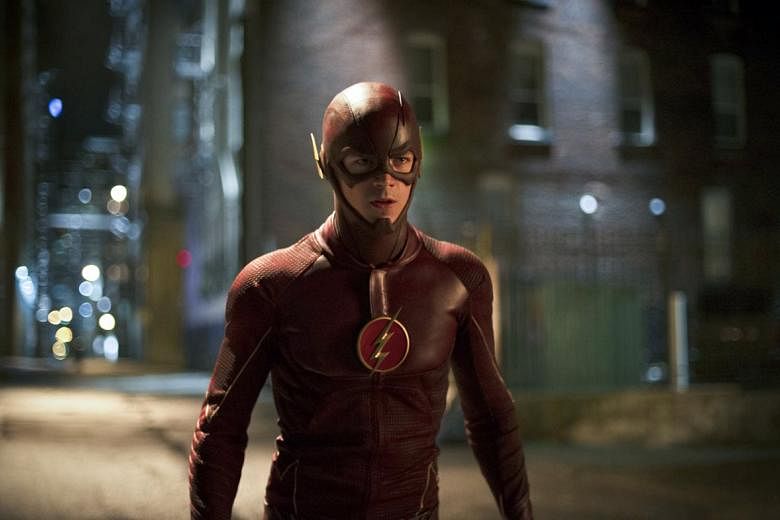NEW YORK • Over the weekend, two of the most famous comic book heroes of all time punched each other senseless to big box-office success. This week, over on the small screen, two of their cousins are pairing off in a less contentious fashion.
On Monday night, the title hero on The Flash leapt across networks, racing from his CW series to appear on CBS' Supergirl. Getting these heroes (Melissa Benoist and Grant Gustin) to meet is the result of careful world-building or, in this case, worlds-building.
The Flash has introduced a favourite DC Comics concept to television: "the multiverse", an endless array of parallel universes. Flash recently visited Earth 2, a world in which the bachelor hero was married; the man who raised him was a jazz singer, not a detective; and enemies were allies. Compared to that, a jump to Super- girl's world seems like a joy ride.
"If that hadn't worked with Flash and Earth 2, I'm not so sure we would be able to say this is the way we can connect Flash to Supergirl," said Mr Greg Berlanti, executive producer of both shows.
Characters from one TV series have appeared on another often enough to no longer be a novelty. But crossing the network boundary has been relatively rare. One successful exchange was in 1998, when lawyers from The Practice, on ABC, met those from Ally McBeal, on Fox. Both series came from the creator and executive producer David E. Kelley.
The audience demographics for CBS (generally older) and CW (generally younger) mean that both shows stand to gain from a crossover. Supergirl soared upon its premiere last fall with almost 13 million viewers, but has been in steady decline. Its most recent episode had just under six million viewers - fewer than many of its neighbours on CBS.
On the other hand, the first season of The Flash was the CW's highest- rated show in 2014, averaging close to four million viewers. The episode may bring new viewers to each show.
The groundwork for Monday's meeting can be traced back to the CW series Arrow, which began in 2012. That series follows the adventures of Oliver Queen, a vigilante known as Green Arrow in the comics, and its success helped open the door to more DC heroes on television.
Arrow introduced Barry Allen, the crime scene investigator who would become Flash, in its second season, and he soon graduated to his own series. Flash opened up the Arrow universe to the exploration of superpowers, time travel, parallel worlds and alternate realities. Supergirl's Earth has Superman and some other heroes, but no Flash or Green Arrow.
For those keeping score at home, the DC film universe, where Batman and Superman just battled it out, is separate from the DC TV universe, which connects the CW's Arrow, The Flash and Legends Of Tomorrow to Constantine (which ran for one season on NBC), Supergirl (on CBS) and Vixen (an animated series on CW's streaming platform). Gotham, on Fox, which chronicles the formative years of Bruce Wayne and some of his adversaries, is its own world.
In contrast, Marvel's network TV shows (Agents Of S.H.I.E.L.D. and Agent Carter) and its Netflix series (Daredevil, Jessica Jones and the coming Luke Cage) are part of the world presented in the films from Marvel Studios, which this spring will include Captain America: Civil War.
Comic book fans are intimately familiar with this type of minutia, but will keeping track of who's who on what Earth be too challenging for viewers?
"Only if we make it complicated," said Mr Geoff Johns, chief creative officer at DC Entertainment. "The possibilities are endless. There are no rules."
But he knows it is a balancing act.
"Mythology is amazing, but the character and story have to come before that. If it's just about myth- ology, it's going to become confusing, like the worst comics are."
For Mr Berlanti, the shows work best when they celebrate what fans love about reading comic books.
"When you picked up a comic, you didn't know which character might show up," he said. "It introduced a character to a new reader or refined what you loved about the character in the past. It helped you enjoy two great tastes that taste great together."
NEW YORK TIMES


